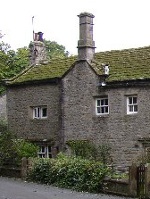Wuthering Heights Contents
- Social / political context
- Educational context
- Religious / philosophical context of Wuthering Heights
- Literary context of Wuthering Heights
- Chapter 1
- Chapter 2
- Chapter 3
- Chapter 4
- Chapter 5
- Chapter 6
- Chapter 7
- Chapter 8
- Chapter 9
- Chapter 10
- Chapter 11
- Chapter 12
- Chapter 13
- Chapter 14
- Chapter 15
- Chapter 16
- Chapter 17
- Chapter 18
- Chapter 19
- Chapter 20
- Chapter 21
- Chapter 22
- Chapter 23
- Chapter 24
- Chapter 25
- Chapter 26
- Chapter 27
- Chapter 28
- Chapter 29
- Chapter 30
- Chapter 31
- Chapter 32
- Chapter 33
- Chapter 34
Chapter 20
Synopsis
Narrator: Nelly.
Linton is taken to Wuthering Heights by Nelly, who leaves him there. Heathcliff wants his son to stay alive until he (Linton) has inherited Thrushcross Grange. Linton is confused and scared.
Commentary
Heathcliff has become thoroughly cruel and is focused only on his revenge.
And what is my father like?: Nelly’s response offers more comparison between Edgar and Heathcliff, and then between Heathcliff and Linton, encouraging us to see characters in pairs. (See Characterisation > Doubling characters.)
 Low browed lattices: small windows, described here like eyes in the house.
Low browed lattices: small windows, described here like eyes in the house.
my property .. it .. thing!: Just as Heathcliff was initially referred to as a thing, so he objectifies Linton, regarding him purely as a possession rather than a person.
Ague: a feverish fit.
Puling: weak and whining.
Cipher: a person of no importance.
Sole consideration: Heathcliff admits that his only interest in his own son is his position in the line of inheritance. Brontë has made this more acceptable because Linton is so difficult to like or admire.
whelp: Just as Isabella was negatively referred to as a ‘brach’ or female dog (bitch), so her son is a vulnerable ‘whelp’ or pup
Investigating Chapter 20
- Much of this chapter is told through dialogue.
- What does Brontë achieve as a result of this approach?
